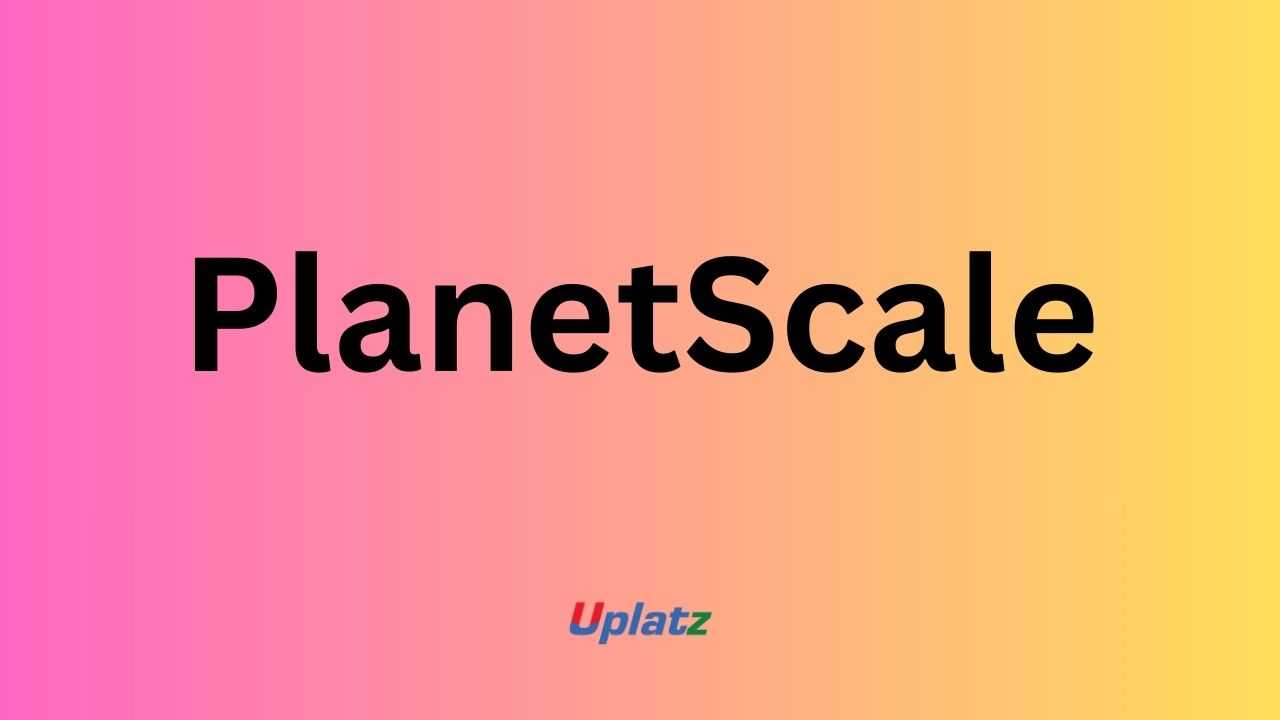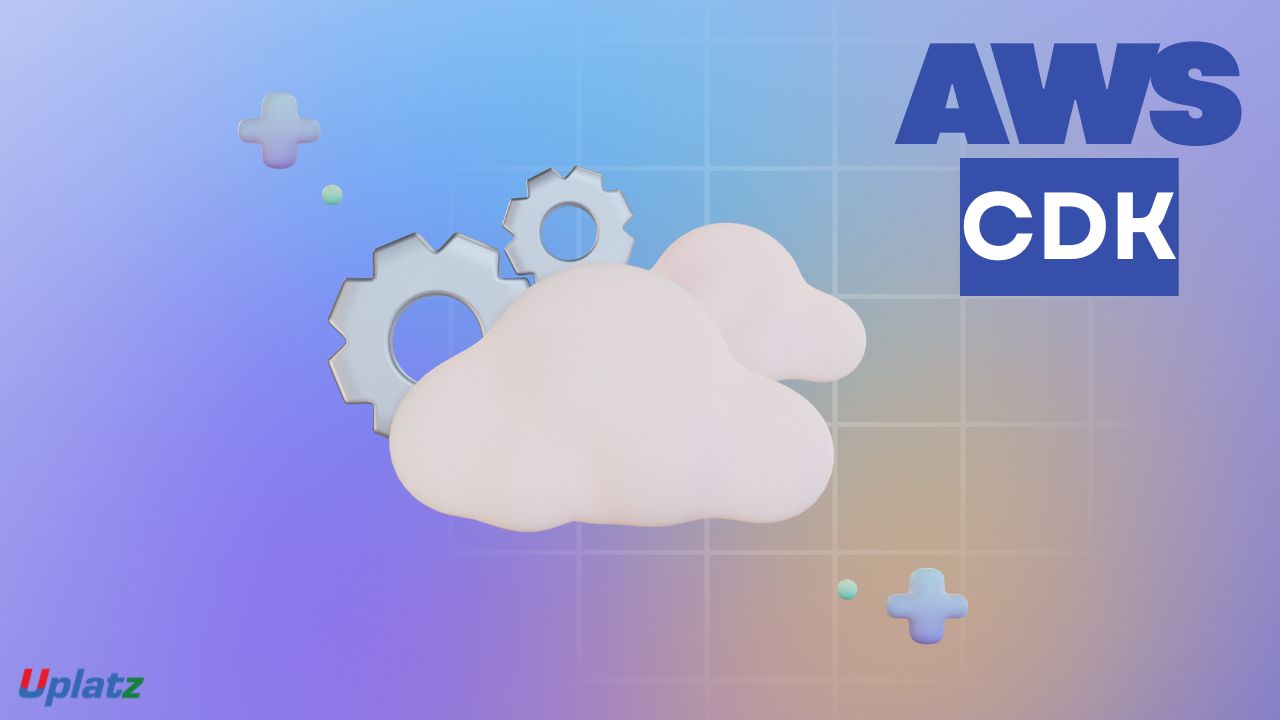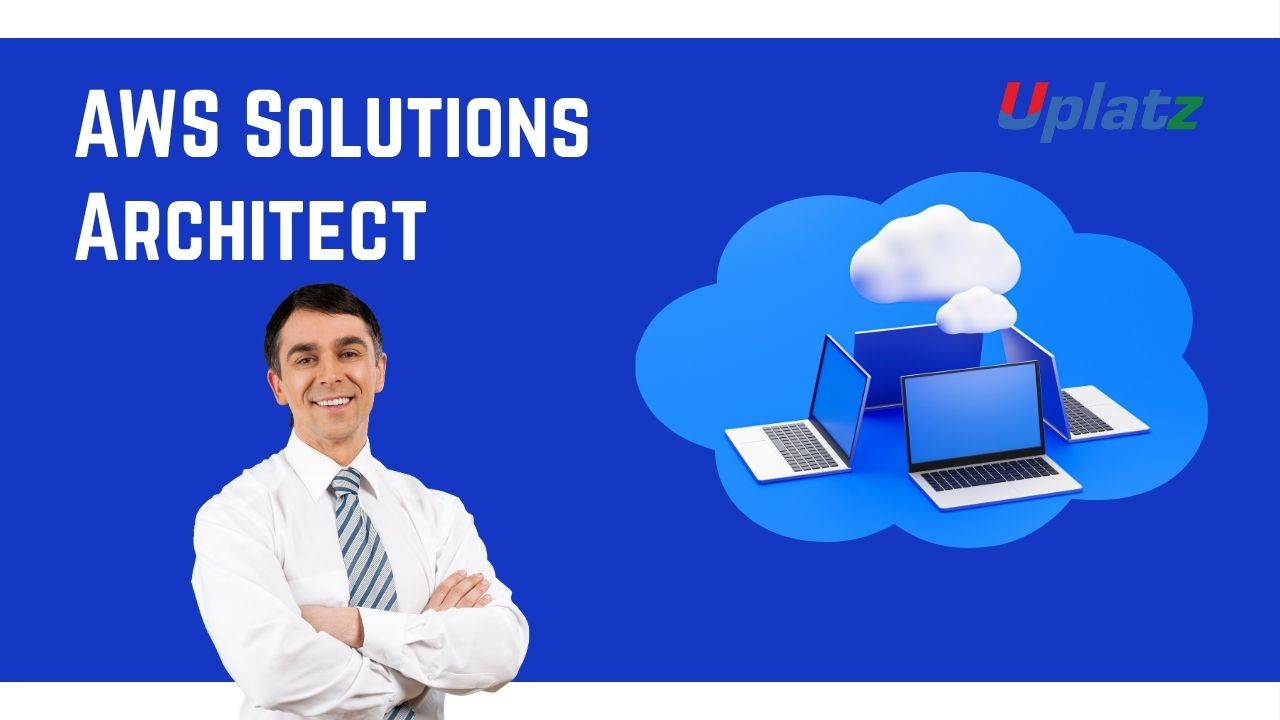PlanetScale
Master PlanetScale, the serverless database platform powered by Vitess, designed for scale, speed, and modern cloud applications. Price Match Guarantee
Full Lifetime Access
Access on any Device
Technical Support
Secure Checkout
Course Completion Certificate
Price Match Guarantee
Full Lifetime Access
Access on any Device
Technical Support
Secure Checkout
Course Completion Certificate
 97% Started a new career
BUY THIS COURSE (
97% Started a new career
BUY THIS COURSE (GBP 12 GBP 29 )-
 86% Got a pay increase and promotion
86% Got a pay increase and promotion
Students also bought -
-

- Neon Postgres
- 10 Hours
- GBP 12
- 10 Learners
-

- AWS CDK
- 10 Hours
- GBP 12
- 10 Learners
-

- AWS Solutions Architect – Master Cloud Design, Security, and Scalability on AWS
- 10 Hours
- GBP 12
- 10 Learners

PlanetScale is a next-generation serverless relational database platform built on Vitess, the open-source clustering system originally developed at YouTube to scale MySQL for billions of users. Combining the familiarity of MySQL with the power of cloud-native scalability, PlanetScale enables developers to build high-performance, reliable, and infinitely scalable databases — without worrying about infrastructure, downtime, or manual scaling.
This Mastering PlanetScale – Self-Paced Online Course by Uplatz provides a complete learning experience covering PlanetScale’s architecture, schema design, branching, migrations, performance optimization, and integrations. You’ll learn how to design and manage production-ready databases that are both developer-friendly and enterprise-grade, all within a fully managed serverless environment.
By the end of this course, you’ll have the skills and confidence to design, deploy, and maintain scalable MySQL databases powered by PlanetScale — perfect for modern SaaS, web, and enterprise applications.
🔍 What is PlanetScale?
PlanetScale is a serverless, cloud-based database platform that brings infinite scalability and developer productivity to MySQL. It’s built on top of Vitess, the same technology used by YouTube, Slack, and Square to manage massive data workloads with ease.
PlanetScale allows developers to enjoy the power and reliability of MySQL with a modern developer workflow — including branching, schema changes without downtime, automatic scaling, and connection pooling.
Unlike traditional relational databases, PlanetScale separates storage, compute, and routing, enabling on-demand scaling and operational flexibility. Its Git-like database branching allows teams to make schema changes safely, review them, and merge updates seamlessly — just like managing code repositories.
In short, PlanetScale brings the best of DevOps and Git workflows into the world of databases, making scalable MySQL accessible, intuitive, and fully managed.
⚙️ How PlanetScale Works
PlanetScale leverages the Vitess engine to power distributed, fault-tolerant, and scalable MySQL clusters. Its architecture is designed for serverless operation, meaning developers never manage servers, replicas, or sharding manually.
Here’s how it works:
-
Vitess as the Core Engine: Vitess acts as a middleware layer that manages database sharding, query routing, and load balancing.
-
Serverless Operation: PlanetScale abstracts infrastructure, automatically handling scaling, replication, and backups.
-
Branching Workflow: Similar to Git, you can create branches of your database for development, testing, or staging, then merge schema changes back to production without downtime.
-
Schema Migration: Perform live schema updates using PlanetScale’s non-blocking migration system, ensuring zero downtime.
-
Integrations and APIs: Easily connect your database to Prisma, Sequelize, Laravel, and serverless frameworks such as Next.js, Vercel, or AWS Lambda.
-
Performance and Monitoring: Built-in analytics, query insights, and automated tuning tools allow continuous optimization.
This combination of Vitess scalability and PlanetScale’s managed experience makes it the ideal solution for teams building reliable, mission-critical databases.
🏭 How PlanetScale is Used in the Industry
PlanetScale is rapidly becoming the go-to database platform for modern SaaS companies, startups, and enterprise applications requiring high scalability and zero downtime. It’s widely adopted across industries such as e-commerce, fintech, edtech, gaming, and data analytics.
Common use cases include:
-
SaaS Platforms: Multi-tenant applications needing global scale and uptime.
-
E-Commerce: Handling millions of concurrent transactions seamlessly.
-
APIs and Microservices: Reliable, horizontally scalable relational data storage.
-
Serverless Apps: Seamless integration with modern frameworks like Next.js and Vercel.
-
Enterprise Systems: Migrating legacy MySQL databases to a managed, cloud-native architecture.
By leveraging PlanetScale, companies reduce operational overhead, achieve automatic scaling, and empower developers with branch-based database workflows that fit modern DevOps and CI/CD pipelines.
🌟 Benefits of Learning PlanetScale
Mastering PlanetScale gives you the expertise to build cloud-native, fault-tolerant databases that scale with your application’s growth.
Key benefits include:
-
Serverless Architecture: No provisioning, scaling, or maintenance required.
-
MySQL Compatibility: Familiar syntax and tooling with modern scalability.
-
Branching Workflow: Safely test schema changes using Git-style workflows.
-
Zero-Downtime Migrations: Update schemas without interrupting production workloads.
-
Scalability: Built to handle billions of queries and petabytes of data.
-
Developer Productivity: Integrates easily with ORMs and CI/CD pipelines.
-
High Availability: Global distribution and automatic failover ensure resilience.
-
Career Growth: Gain in-demand skills in cloud databases, MySQL scaling, and serverless infrastructure.
With PlanetScale, you can manage databases like code — versioned, reviewed, and deployed automatically, bringing a new level of agility to database development.
📘 What You’ll Learn in This Course
This course is structured to take you from beginner to advanced levels, providing a clear roadmap for mastering PlanetScale. You will learn how to:
-
Understand PlanetScale architecture and its Vitess foundation.
-
Create and manage serverless MySQL databases.
-
Use branching workflows for development, testing, and production.
-
Perform schema migrations without downtime.
-
Integrate PlanetScale with ORMS (Prisma, Sequelize, Knex).
-
Optimize queries, indexes, and connections for performance.
-
Monitor and manage scaling, replication, and latency.
-
Deploy PlanetScale databases in SaaS and enterprise projects.
-
Follow best practices for schema design and cost optimization.
Every module combines conceptual clarity with hands-on labs, real-world examples, and guided exercises to ensure mastery.
🧠 How to Use This Course Effectively
-
Start with Setup: Create your first PlanetScale account and connect your database.
-
Explore Branching: Practice database branching for development and staging.
-
Test Schema Migrations: Learn zero-downtime migrations by modifying sample schemas.
-
Integrate with Applications: Connect PlanetScale to a real app using Prisma or Sequelize.
-
Work on Projects: Build a full-stack project (e.g., e-commerce or task manager) using PlanetScale.
-
Monitor Performance: Use query insights to optimize database operations.
-
Revisit Advanced Topics: Study scaling, sharding, and replication for enterprise-level design.
This progression ensures both theoretical understanding and practical skill development for production use.
👩💻 Who Should Take This Course
This course is ideal for:
-
Developers building modern SaaS and web applications.
-
Database Engineers managing large-scale or distributed systems.
-
Full-Stack Developers using MySQL-based apps in cloud environments.
-
Startups & Enterprises adopting serverless databases for agility.
-
Students & Professionals learning scalable, cloud-native DB management.
No prior Vitess experience is required — basic MySQL knowledge will help you get started quickly.
🧩 Course Format and Certification
This course is self-paced and includes:
-
HD video lessons with guided demos and explanations.
-
Downloadable examples and PlanetScale workflows.
-
Real-world project applications and case studies.
-
Quizzes and checkpoints to test your understanding.
-
Lifetime access and content updates as PlanetScale evolves.
Upon completion, you’ll receive a Course Completion Certificate from Uplatz, validating your proficiency in PlanetScale database management, scaling, and deployment.
🚀 Why This Course Stands Out
-
End-to-End Coverage: From fundamentals to enterprise deployment.
-
Hands-On Learning: Practical exercises and live demos.
-
Modern Focus: Aligns with real-world SaaS and cloud architectures.
-
Performance Optimization: Learn tuning, scaling, and best practices.
-
Career Advantage: Equip yourself with one of the most in-demand cloud DB skills.
By the end of this course, you’ll be ready to build and maintain highly scalable, production-grade databases using PlanetScale’s powerful serverless capabilities.
🌐 Final Takeaway
In an era where scalability and uptime are non-negotiable, PlanetScale stands at the forefront of modern database innovation. It bridges the gap between traditional relational databases and cloud-native architectures, combining the simplicity of MySQL with the scalability of Vitess.
The Mastering PlanetScale – Self-Paced Online Course by Uplatz equips you with the knowledge and skills to harness PlanetScale’s full potential — from branching and migrations to integration and optimization.
Whether you’re a developer, database engineer, or full-stack architect, this course helps you design serverless, high-performance databases ready for real-world production.
Start learning today and master PlanetScale, the database platform that powers the future of scalable web and enterprise applications.
By completing this course, learners will:
-
Deploy and configure PlanetScale databases.
-
Use branching, merging, and schema changes effectively.
-
Integrate PlanetScale with application backends.
-
Optimize queries for scalability and performance.
-
Apply best practices in security and governance.
Course Syllabus
Module 1: Introduction to PlanetScale
-
What is PlanetScale?
-
Vitess overview and MySQL compatibility
-
PlanetScale vs traditional RDS and Aurora
Module 2: Getting Started
-
Setting up a PlanetScale account
-
Creating and connecting to databases
-
Using PlanetScale CLI
Module 3: Branching & Workflows
-
Database branching explained
-
Development vs production workflows
-
Schema changes and deploy requests
Module 4: Schema Management
-
Zero-downtime schema migrations
-
Managing indexes and constraints
-
Rollbacks and safe deployments
Module 5: Integrations
-
Using PlanetScale with Prisma ORM
-
Connecting with Sequelize and TypeORM
-
Serverless platforms: Vercel, Netlify, AWS Lambda
Module 6: Data & Queries
-
Running queries with PlanetScale
-
Query optimization basics
-
Handling transactions and consistency
Module 7: Scaling & Performance
-
Horizontal scaling with Vitess
-
Sharding and partitioning
-
Monitoring database performance
Module 8: Security & Governance
-
Role-based access controls
-
SSL/TLS connections
-
Audit logs and compliance
Module 9: Real-World Projects
-
SaaS multi-tenant database with PlanetScale
-
E-commerce backend with Prisma + PlanetScale
-
Analytics pipeline integration
Module 10: Best Practices
-
Designing apps for serverless databases
-
CI/CD workflows with PlanetScale
-
Future of serverless relational databases
Learners will receive a Certificate of Completion from Uplatz, validating their expertise in PlanetScale and modern serverless database management. This certification demonstrates readiness for roles in backend development, database engineering, and cloud-native systems.
PlanetScale skills prepare learners for roles such as:
-
Backend Developer (MySQL + Serverless)
-
Database Engineer
-
Cloud Infrastructure Engineer
-
Full-Stack Developer (SaaS & Enterprise)
-
Data Engineer
PlanetScale is rapidly becoming the go-to database for serverless and SaaS companies, making it a future-proof skill for developers.
-
What is PlanetScale?
PlanetScale is a serverless database platform built on Vitess, offering scalable MySQL-compatible databases. -
How does PlanetScale differ from MySQL?
It provides branching, zero-downtime schema changes, and scalability, features not available in traditional MySQL. -
What is Vitess?
An open-source database clustering system that powers PlanetScale and enables sharding and scaling. -
What is database branching in PlanetScale?
It allows developers to create isolated database environments, similar to Git branches. -
What are deploy requests in PlanetScale?
A workflow for reviewing and merging schema changes safely. -
What ORMs work with PlanetScale?
Prisma, Sequelize, TypeORM, and other MySQL-compatible ORMs. -
How does PlanetScale handle schema migrations?
It provides non-blocking, zero-downtime migrations. -
What is PlanetScale best used for?
SaaS platforms, e-commerce apps, analytics pipelines, and cloud-native projects. -
What are the advantages of PlanetScale over AWS RDS?
Branching, infinite scalability, developer workflows, and better CI/CD integration. -
Where is PlanetScale commonly adopted?
Among startups, SaaS companies, and enterprises needing scalable, MySQL-compatible serverless databases.









